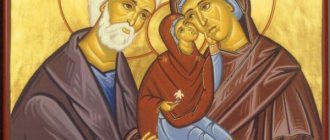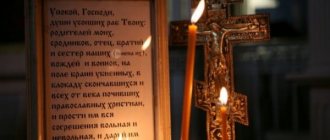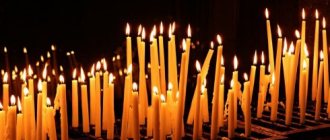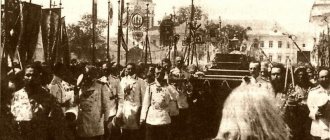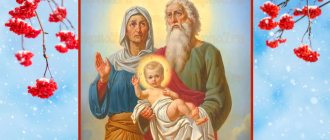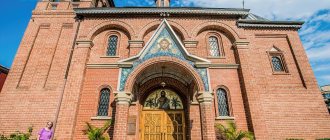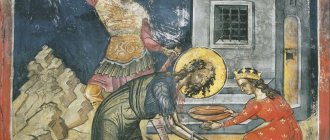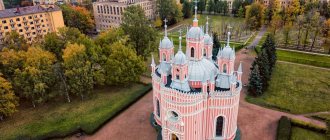The birth of the honest and glorious prophet and Forerunner, the Baptist of the Lord, John - this is the name of the holiday established in honor of the birth of a son to the righteous Zechariah and Elizabeth , who later became John the Baptist (otherwise called the Forerunner). Refers to the great holidays, immutable, celebrated annually on July 7 (June 24, old style). This day always falls on Peter's Fast. The feast of the Nativity of John the Baptist is six months away from the Nativity of Christ, according to the Gospel narrative. Since the Nativity of Christ was timed to coincide with the winter solstice, the birth of John the Baptist was timed to coincide with the summer solstice. After the Nativity of Christ, the day begins to increase, and after the birth of John the Baptist, it begins to decrease. This reminds us of the words of John the Baptist :
I am not the Christ, but I am sent before Him. He who has the bride is the groom, and the friend of the groom, standing and listening to him, rejoices with joy, hearing the voice of the groom. This is my joy fulfilled. He must increase, but I must decrease (John 3:28-30).
The Lord Jesus Christ himself called John an angel and said that among those born of women there never arose a greater one than John the Baptist (Matthew 11:10-11). In the Orthodox tradition, John the Baptist is revered as the greatest saint (after the Mother of God); he is called the first monk, the first missionary and even the first martyr.
From the editor: The spelling and pronunciation of the epithet “Forerunner” to the name of the Baptist of the Lord John differs in the Old Believer and New Believer traditions. The word “forerunner” was borrowed from the Old Church Slavonic language, in which it was formed from the verb pradtechi - “to go (flow) ahead, to get ahead” using the tracing method from the Greek prodromos (where pro - “before”, dromos - “movement”). John the Baptist is called the Forerunner (literally “predecessor”), who, according to the Gospel, announced the coming of Jesus Christ. In the old pre-schism tradition, John the Baptist is usually called “Forerunner” (as a result of the development of the language, O arose in place of Ъ), while in the modern Russian language and the post-schism (Nikonian) church, the sound Ъ was removed for some reason and became commonly used title "Forerunner". In this article we will adhere to the name “Forerunner”, generally accepted in modern Russian.
Name of the Feast of the Nativity of John the Baptist
The Nativity of the honest, glorious Prophet, Forerunner and Baptist of the Lord John - this is the full name of the holiday.
Nativity of John the Baptist
- This is one of the great holidays. Great holidays in importance come after the 12 twelfth holidays. The Nativity of John the Baptist is celebrated on July 7 according to the new style. On this day, believers remember how the future prophet was born into the family of the Jewish priest Zechariah and his wife Elizabeth, who would predict the coming of the Messiah - Jesus Christ, and then baptize him in the waters of the Jordan River.
Folk signs for the weather on January 20, 2022
Rain or fog on this day
means a grain harvest.
Clear and cold weather
means the summer will be dry.
The weather is cloudy and snowy and (or) foggy in the morning
- for a harvest year 2022.
There are frosts for 7 days, starting from January 20
- this means an imminent thaw.
If the echo is heard far away
, then frost is expected soon.
If the south wind blows
, then the summer will be harsh.
If it snows
, then it snows throughout Maslenitsa.
Bright sun at noon
means early spring.
The life story of John the Baptist
John the Baptist is the most revered Christian saint after the Virgin Mary. Jesus Christ said about him: “Among those born of women there has not arisen a greater prophet than John the Baptist” (Matthew 11:11).
John the Baptist lived from about 6–2 BC. e. until 30 AD e. The future great prophet was born into the family of the righteous Zechariah and Elizabeth. On his mother's side, John was a relative of Jesus Christ and was born six months earlier than Him.
John was the last of the prophets among many righteous people who predicted the coming of the Messiah, who would free the people of Israel. John is called the Forerunner and Baptist. Forerunner - because he came before Christ and preached His coming to the people. Baptist - because he baptized the Savior in the Jordan.
Before starting his preaching, John lived in the desert for many years - he prepared for his ministry by fasting and prayer. He wore rough clothes and ate only honey and locusts. When he was thirty years old, the Lord commanded him to come out of the desert and preach the coming of Christ.
John came to the Jordan River, in which the Jews traditionally performed religious ablutions. Here he began to talk to the people about repentance and baptism for the remission of sins and to baptize people in the waters. This was not the Sacrament of Baptism as we know it now, but it was its prototype.
The people believed the prophecies of John the Baptist, many were baptized in the Jordan. And then, one day, Jesus Christ himself came to the banks of the river. The Savior asked John to baptize Him. The Prophet was surprised to the depths of his soul and said: “I need to be baptized by You, and are You coming to me?” But Christ assured him that “we must fulfill all righteousness.” During baptism, “the heavens were opened, and the Holy Spirit descended on Him in bodily form like a dove, and there was a voice from heaven, saying: You are My Beloved Son; I am well pleased with You!” (Luke 3:21-22).
The sermon of John the Baptist culminated with the Baptism of Christ. He was facing martyrdom. King Herod Antipas, the son of King Herod the Great (who after the Nativity of Christ ordered the death of all Bethlehem babies) imprisoned the prophet for denouncing his criminal marriage with Herodias. At a birthday feast, Herodias' daughter Salome danced for Herod, and as a reward for the dance, her mother persuaded her to ask the king for the death of the prophet. John the Baptist's head was cut off, and Salome brought it to Herodias on a platter. In memory of this, a church holiday was established - the Beheading of John the Baptist.
Popular beliefs
Seeing a mouse in the house
means a new addition to the family is expected.
It is forbidden to kill mice on January 20
, as they are the bearers of good news. Our ancestors associated a killed animal with an unborn child, which was especially scary for pregnant women.
Seeing a swan or a wild goose
means the fulfillment of your most cherished desire.
It is forbidden to drive wild ducks from the river
- otherwise the desired will not come true.
Events of the Nativity of John the Baptist
In the Gospel of Luke we read the miraculous story of the conception of John the Baptist. Archangel Gabriel appeared to his father, the Jewish priest Zechariah, when he served in the Jerusalem Temple. And he announced to him the birth of his son:
«The angel said to him: Do not be afraid, Zechariah, for your prayer has been heard, and your wife Elizabeth will bear you a son, and you will call his name John; and you will have joy and gladness, and many will rejoice at his birth, for he will be great before the Lord; He will not drink wine or strong drink, and will be filled with the Holy Spirit from his mother’s womb; and he will turn many of the children of Israel to the Lord their God; And he will go before Him in the spirit and power of Elijah, to restore the hearts of the fathers to the children, and to the disobedient the minds of the righteous, to present to the Lord a prepared people.”
. (OK
1
:13-17).
Zechariah did not believe the angel: after all, he and Elizabeth were already elderly people and, moreover, barren. For his lack of trust, the Archangel punished him with muteness.
Elizabeth was a relative of the Virgin Mary. Mary came to visit the pregnant Elizabeth, and “ when Elizabeth heard Mary’s greeting, the baby leaped in her womb; and Elizabeth was filled with the Holy Spirit
"(Luke 1:41).
As the Evangelist Luke writes, John the Baptist was born six months earlier than Jesus. On the eighth day, according to the law of Moses, his circumcision took place. The mother named her son John, and this greatly surprised the relatives: no one in the family bore this name. But Zechariah, who was still mute, took the tablet and wrote: “His name is John.” At that same moment, the priest regained the power of speech and immediately began to glorify the Lord and say that his son would predict the coming of the Messiah to the entire Jewish people.
After the Nativity of Jesus Christ, King Herod the Great ordered the killing of all babies in the city of Bethlehem. Having learned about this, the mother of John the Baptist, Elizabeth, fled with her son into the desert. As the legend says, Zechariah remained in Jerusalem: he was supposed to perform his priestly service in the temple. Herod sent soldiers to him - he wanted to find out where Elizabeth and the baby were hiding. Zechariah did not reveal the secret, and he was killed right in the temple.
According to legend, righteous Elizabeth lived in the desert with her son. After her death, John spent his days in prayer and fasting, so the prophet prepared himself for preaching about the coming of the Messiah - the Savior.
Signs about Ivan Kupala Day
Heavy dew on Ivan - for a harvest of cucumbers, a starry night - there will be a lot of mushrooms, a thunderstorm - the nuts will be empty and there will be few of them.
Fireflies appear on Midsummer night.
Flowers smell stronger before it rains.
Before Midsummer, there is rain in the area (there will be more bread), after Midsummer there is rain in the area.
During haymaking, rains are bad for the hay, but good for the grain.
The grass is black - the horses are fed (the hay is dead, but the oats are good).
On Ivan's Day, the grain should come out, but if it doesn't, it's a bad omen.
On Ivan's Day there is a spikelet, so on Ilya's Day there is a bun in a good year (Pinezhye).
Feed me until Ivan, I will make you a gentleman (says the bee).
Honey appears two or three days before Ivan Kupala or after during the same period.
Prayers of the Nativity of John the Baptist
Troparion to the Nativity of John the Baptist
voice 4th
Prophet and Forerunner of the coming of Christ, we are worthy to praise thee, we are perplexed by the love of thee: the barrenness of the one who gave birth and the silence of the father was resolved by your glorious and honest birth, and the incarnation of the Son of God is preached to the world.
Translation:
Prophet and Forerunner of the coming of Christ, we, who lovingly honor you, are perplexed as to how to worthily praise you: for the infertility of the woman who gave birth and the dumbness of the father were resolved by your glorious and holy birth, and the incarnation of the Son of God is announced to the world.
Kontakion to the Nativity of John the Baptist
voice 3rd
Before the barrenness of the day, Christ gives birth to the Forerunner, and that is the fulfillment of every prophecy: For the prophets preached Him, having laid their hand on Him in the Jordan, the prophet, the preacher, and the Forerunner of God's Word appeared.
Translation:
The formerly barren one now gives birth to the Forerunner of Christ, and he is the fulfillment of all prophecies: for, having laid his hand in the Jordan on Him whom the prophets foretold, he appeared as a prophet of the Word of God, a preacher, and at the same time a Forerunner.
Glorification of the Nativity of John the Baptist
We magnify you, the Forerunner of the Savior, John, and honor your glorious birth from the fruitless.
Translation:
We glorify you, Forerunner of the Savior John, and honor your glorious birth from your barren mother.
Iconography of the Nativity of John the Baptist
The very first surviving icon of the Nativity of John the Baptist was found on the frescoes of the St. Sophia Church in Ohrid; it was painted in the middle of the 11th century.
In the Byzantine era, the iconographic plot of the holiday was central to the childhood cycle of John the Baptist. Icon painters depicted the righteous Elizabeth lying on a bed. The plot also included the gospel episode “The naming of John by Zechariah.”
In the 14th century, everyday details began to appear on the icons of the Nativity of John the Baptist: an image of a table with food next to Elizabeth’s bed, the scene of “Rolling the Baby.” In the 16th - 17th centuries, the birth of the prophet also became part of his life cycles.
Hand of John the Baptist
The Hand of John the Baptist is a Christian shrine that is kept in the Cetinje Monastery in Montenegro. The right hand is the right hand of the prophet. According to legend, John the Baptist laid his right hand on the head of the Savior when he baptized Him in the waters of the Jordan River.
The history of this shrine comes from the Apostle Luke, who, as church tradition says, took it from Sebaste and transferred it to his native Antioch as a gift to the local Christian community. After Antioch fell in the 10th century, the right hand was transported to Chalcedon and then to Constantinople. When Constantinople was captured by the Turks in 1453, the relic went to the island of Rhodes. When the Turks captured Rhodes in 1522, the shrine was transported to Malta.
Almost three centuries later, in 1799, the Order of Malta transferred the right hand of John the Baptist to Russia. After the October Revolution, the shrine was taken outside the country, and until 1993 it was considered lost. It later turned out that in 1951, Yugoslav security officers requisitioned the right hand from the storage of the State Historical Museum in Cetinje. And already in the 90s of the 20th century it was discovered in the Cetinje Monastery in Montenegro.
What not to do on January 20, 2022?
The Cathedral of John the Baptist finally ends the period of Christmas celebrations and Christmastide. For 7 days after Epiphany, it was forbidden to wash clothes in reservoirs
.
According to popular beliefs, on January 20, 2022, you should not
pick up pins or needles from the floor, look in the mirror for a long time, drink from glass mugs and cups, and also take risks, especially with your health.
You cannot wash your face on this day
, otherwise you will become a victim of deception. Our ancestors believed that in this way a person washes away his protection from the tricks of deceivers. Accordingly, he becomes gullible, which can be taken advantage of by liars, thieves and scammers.
You can’t indulge in sadness
, otherwise you’ll spend the entire year 2022 crying.
It is not recommended
to accept gifts from strangers.
You can’t start a feast with the first courses
- according to the legend, then you won’t achieve a single goal within a year.
On the day of John the Baptist before breakfast, you cannot talk to anyone
until you drink a little water blessed for Epiphany - you can get sick. Anyone who starts their morning meal with holy water will spend the entire year of 2022 in good health.
It is forbidden to swear, be lazy and refuse to help those in need.
Idlers will spend 2022 in poverty and hunger. According to the customs of our ancestors, on the day of John the Baptist it was not allowed to be lazy even at gatherings. According to popular belief, whoever disobeys this prohibition will live the entire New Year in debt. To prevent this from happening, girls and boys came to gatherings with sewing, knitting, spinning, as well as equipment that needed repairing.
Photo
Church of the Nativity of St. John the Baptist on Presnya
The Church of the Nativity of St. John the Baptist on Presnya is located in the Presnensky district of Moscow, at the address: Maly Predtechensky Lane, building 2. This church has an amazing history. It was built on the site where ancient pagan rites associated with the Slavic holiday of Ivan Kupala were held. The construction of the temple was a kind of missionary work - they tried to enlighten Muscovites with the light of Christ.
In the 18th century, at one time the spiritual center of the Georgian diaspora in Russia was located here and there was a cathedra of the Georgian metropolitan.
During the Soviet years, the church was opened, thanks to which many icons and frescoes of the 17th-18th centuries were preserved. At the end of the 19th century, the great artist Viktor Vasnetsov worked here. Unfortunately, almost all of his frescoes were then covered with layers of paint. And only in 2007, restorers carried out conservation of the master’s works.
What should you do on January 20, 2022?
Drinking a little holy water on an empty stomach
means protecting yourself from diseases for the entire year 2022. Illuminated water was also added to domestic animals to ensure their good health.
At the table you were supposed to drink stronger drinks, but in moderation.
Under no circumstances should you get drunk - just wash away, so to speak, everything bad. That’s why the proverb: “Celebrate once a month - you will be cheerful; If you celebrate every day, you will be naked.”
If on this day a guy or girl’s appetite suddenly runs wild
, then, according to popular belief, his beloved is yearning for this person.
The leftovers after the holidays,
according to tradition, are not thrown away, but fed to pets.
Midsummer opened a new cycle called meat-eater
, that is, a time (for several weeks) when they ate plenty of meat and had weddings (this is considered a particularly good time for weddings).
It is on January 20 that they try to baptize children
: it is believed that then the children will find happiness.
From January 20th we were already fully back to work
– after the long Christmas holidays. So laziness was now banned.
The holidays have come to an end.
On this occasion they said: “Ivan the Blessed stole all the holidays.” From January 20 until Maslenitsa, weddings were held and matchmakers were called. If there is a wedding or matchmaking on January 20, 2022, the bride needs to drink some wine to ensure a successful marriage.
